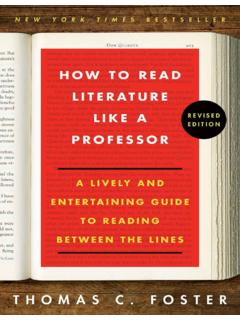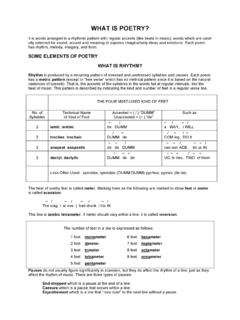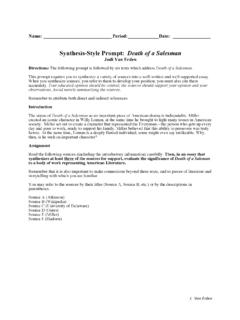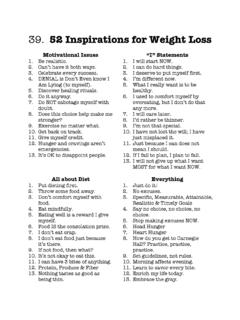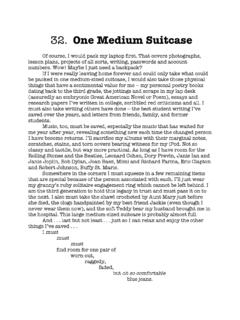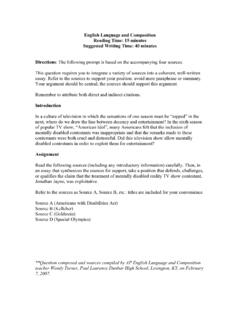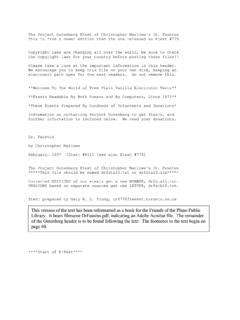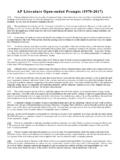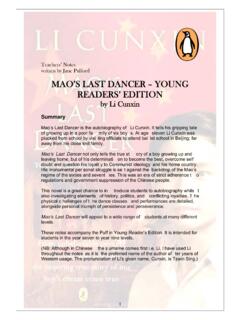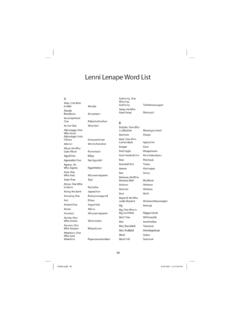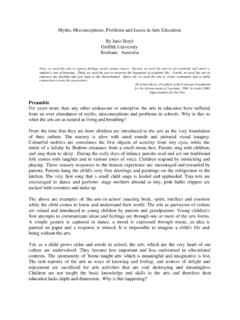Transcription of Holden Today: Still in the Rye - MsEffie
1 TIME Magazine Archive Article -- Holden today : Still in the Rye -- Feb. 7, 1972 6/18/06 4:55 PM. Time Essay Holden today : Still in the Rye By STEFAN KANFER. Monday, Feb. 7, 1972. In the summer of 1951, a modest 277-page book was published. Its author: the little- known short-story writer Salinger. Its narrator: Holden Caulfield, a 16-year-old whose picaresque journey took him from Pencey Prep (the third private school from which he had been dismissed) to his home in New York City three days later. The Catcher in the Rye became a prodigious bestseller, transfiguring the emotional landscape, the mores and insights of an entire generation. It gave Salinger an abrupt prominence throughout America, Europe.
2 Asia and Africa, and triggered what Critic George Steiner resentfully labeled "the Salinger industry" a furious parsing of the author's fragile corpus. But as Salinger's last story, Hapworth, noted, quoting Proust: "A cathedral, a wave in a storm, a dancer's leap never turn out to be as high as we had hoped." The tide has gone out; the factories of the Salinger industry have experienced vast layoffs; the author himself has not communicated with his readers for seven years. And Holden Caulfield has his voice been muted by his creator's silence? What happens to a prodigy two decades after his debut, when he is pushing 40? An admirer can only hazard a guess: IF you really want to hear about it, with the stylistic tics and all, the what-ever-happened- to-Soames-Forsyte kind of crap, you'll have to look elsewhere.
3 When I was a cynosure I. spake as a cynosure, and when I grew up I gave the vocabulary to the parodists. Actuarially speaking, a generation has grown since I first appeared. Gazing at that boy with the red hunting cap on the old Signet paperback, I wonder: What would he think of me today ? But then that gray-and-white snapshot in your high school yearbook what is that youth to you? Would you have anything to say to each other now? Anyway, when we last left me, I was in a California institution for the emotionally disturbed. In ascending order I was suffering from 1) underweight, 2) pneumonia, 3). debilitation, and 4) terminal sanctity. The first three were cured handily.
4 My brother kept driving over from Hollywood with sandwiches and books; the books were supposed to cure No. 4. Perhaps they did. Maybe you were one of those who felt that after all the maundering I would wind up exactly like my father that all along I was a conformist manqu . You were right. Boy, were you right! For a while. A long while. At first I bought the whole shot. My head got straight; I went to Columbia after I said I would never go to any of those phony Ivy schools and even tried a year of law school. I wore a Tattersall vest. I even wore a hat, for God's sake. Not a red hunting cap, I mean a hat. A whaddyacall it. A fedora. My father used to rate me like a New York pollution inspector: good, acceptable, unhealthy.
5 I. became a Good Boy. It shouldn't surprise you. In those days I was always being compared to Huckleberry Finn. You know how he ended? According to Mark Twain, as a "justice of the peace in a remote village in Montana, and was a good citizen and greatly respected." If you get slipped a Finn like that, what can you reasonably expect of me? I married right out of college. Old Sally Hayes, of course. Even though I said, "I didn't even like her much," I also admitted, "I felt like I was in love with her and wanted to marry her. I. swear to God I'm crazy. I admit it." We horsed around in an apartment in the East Village that had a fireplace and what she called "tons of charm.
6 " My father got me a job in a public ,23657,905734, Page 1 of 4. TIME Magazine Archive Article -- Holden today : Still in the Rye -- Feb. 7, 1972 6/18/06 4:55 PM. relations company. I built images, including my own, and took to preceding all my sentences with "Actually.". You remember Mr. Antolini talking to me? Just before I went to sleep and woke up with him touching my hair and making me jump about a thousand feet? He said: "I have a feeling that you're riding for some kind of terrible, terrible fall .. It may be the kind where at the age of 30 you sit in some bar hating everybody who comes in looking as if he might have played football in college.
7 Then again, you may pick up just enough education to hate people who say, 'It's a secret between he and I.' Or you may end up in some business office, throwing paper clips at the nearest stenographer." I chose all three. I. hated jocks, grimaced at grocery stores with signs selling APPLE'S, and I threw paper clips at stenographers. Then I threw myself. The old Caulfield Charm. I couldn't believe what was happening to me. But then I could never believe what happened to me in life or in lit.. Of all the lorn, adolescent souls kicking around the bestseller list, why did 7 make the existential leap to Required Reading? I was writing a mad letter, not a petition.
8 How did it acquire so many signers? I mean not just kids, but critics. Because I think they felt, as I. did, that uncertainty was the American state of mind. Old Gertrude Stein on her deathbed sighed, "What is the answer?" And topped it with "What is the question?" You could go to literary distinction with that kind of exit line, and in a sense, that is where Salinger took me. In a senescent epoch, even the young are senile. America in the '50s was undergoing adolescence. Again. I was its sudden, unbidden spokesyouth. But surely there have been free alterations since 1951. Nonfiction is in the bucket seat and drives mankind. By now I. should be a literary footnote.
9 But no: the paperback sold more than 3,000,000 copies between 1953 and 1964. And even more between then and now. How do you figure that? I mean, those glancing insights, those adolescent knight-errantries, aren't they old news? Haven't our tastes altered 180 degrees? Probably not. Inside every man (all right, and every woman) there is a poet who died young. The youth who read me grow younger each day. You had to read The Catcher in the Rye at Andover, for instance. And the new audience is never very different from the old Holden . They may not know the words, but they can hum along with the malady. My distress is theirs. They, too, long for the role of adolescent savior.
10 They, too, are aware of the imminent death in life. As far as the sexual explosion is concerned, I suspect a lot of what you've heard is just noise. "Sex is something I really don't understand too hot," I said. It Still remains a mystery to the adolescent. I have no cure, only consolation: someone has passed this way before. Yet there is something more important, more durable about The Catcher in the Rye. In the interstices of the memoir were seedling predictions, just waiting for the rain. And it came, it came. Take my love/hate for movies. Wouldn't you know that College English would run a piece, without irony, suggesting that my name, "one suspects" one maybe, two never.
